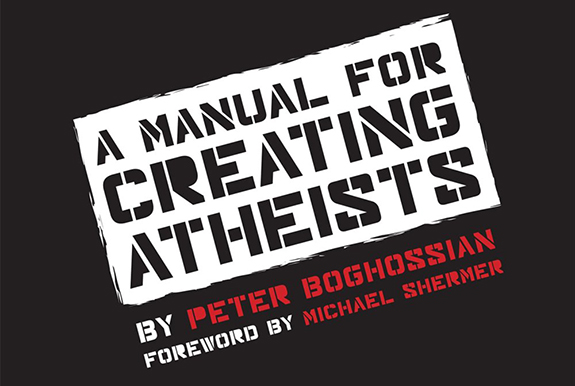A Manual for Creating Atheists: A Critical Review
by Trent Horn
Filed under Atheism, Book Reviews
Since its release last November, Peter Boghossian’s A Manual for Creating Atheists has quickly become one of the most popular new books on atheism (as of now it has 200 reviews on amazon.com). As someone who has also recently written a book on atheism, though from a far different perspective, I was eager to see Boghossian’s method for “creating an atheist.” In this book review I’ll cover the good, the bad, and the ugly in A Manual for Creating Atheists.
The Good
Surprisingly, this book isn’t about creating atheists...per se. According to Boghossian,
“The goal of this book is to create a generation of Street Epistemologists: people equipped with an array of dialectical and clinical tools who actively go into the streets, the prisons, the bars, the churches, the schools, and the community – into any and every place the faithful reside—and help them abandon their faith and embrace reason.”
Epistemology is a discipline within philosophy that focuses on defining knowledge and analyzing how we know what we know. Rather than blindly shout conclusions (which Boghossian no doubt thinks street preachers do), a “street epistemologist” helps others reliably acquire knowledge about the world. When it comes to that goal he’ll find no opposition from me.
Boghossian’s strength lies in his treatment of the Socratic method, or the artful use of questions in order to lead someone to a particular conclusion. This appears to be something he has a lot of first-hand experience in using. According to Portland State University’s website (where Boghossian teaches), he earned a doctorate in education while developing Socratic techniques to help prison inmates increase their reasoning abilities in order to see the error of their ways and to hopefully commit fewer crimes in the future. Boghossian’s ability to use the Socratic method is on display in most of the chapters through sample dialogues between himself and people who exhibit “poor reasoning abilities.”
Boghossian also gives his would-be street epistemologists advice that I would also give to anyone learning apologetics—you don’t need an answer for every objection and you should humbly admit ignorance when it occurs. In Boghossian’s words, “You need to become comfortable in not knowing and not pretending to know...“
But Boghossian’s street epistemologists have a very specific mission beyond just helping people think more clearly—“Your new role is that of an interventionist. Liberator. Your target is faith. Your pro bono clients are individuals who’ve been infected by faith.”
And that’s where the book starts to go downhill.
The Bad
Throughout the book Boghossian says that the quickest way to make someone an atheist is to attack not their religion or their idea of God, but their faith. This is because faith is ultimately what grounds all religious claims. So what is faith? According to Boghossian, faith is belief without sufficient evidence because if you had the proper amount of evidence then you wouldn’t need faith. I’d respond by saying that religious faith is a trust in God and generic “faith” is just a trust in someone or something. For example, we have “faith” that the laws of nature are uniform across time and space even though we don’t have nearly enough evidence to confirm that belief (see the problem of induction).
Now, Boghossian vehemently denies faith is a kind of trust and claims it is instead a kind of knowledge. I disagree and would simply say that faith is the way people justify their claims of religious knowledge. “How do you know Jesus lives?” The believer might say in response, “I have faith in what the Bible or the Church says” or “I have faith in what Jesus has revealed to me in my heart.” Clearly faith is just a trust in a certain kind of evidence that is used to justify religious claims, be it testimonial or experiential.
Boghossian also gives the issue a rather nasty spin when he says faith is, “pretending to know what you don’t know.” The use of the word “pretending” seems inaccurate because it assumes the religious person knows deep down that his beliefs are not justified and he is engaging in a kind of malicious charade. This stands in contrast to the person who "thinks he knows what he knows but is actually mistaken." When it comes to false religious beliefs, I think the overwhelming majority of those beliefs are a product of "thinks he knows, but is mistaken" instead of "pretends he knows, but is wrong."
So this is the main issue Boghossian must answer, “Is the faith religious people have justified? Do they have a rational basis for holding these beliefs?”
I’ll admit sometimes they might not, but you need a serious argument to say religious belief is never justified. Boghossian’s main argument for the claim they are never justified is that because knowledge acquired by faith arrives at contradictory conclusions, such as the Christian’s affirmation of Jesus as the Son of God and the Muslim’s denial of that claim, this means that faith leads many people into error and so it can’t be trusted. But by that logic, reason is unreliable because philosophers use it and arrive at very different conclusions about all sorts of things. All a lack of consensus proves is that some people make faulty inferences based on faith, no that we shouldn’t have faith in either religious testimony or religious experiences.
I also didn’t think that Boghossian interacted enough with Alvin Plantinga (who he refers to as a “Christian apologist” instead of as one of the world’s most famous philosophers of religion). Plantinga’s reformed epistemology claims that if God exists then religious belief in God is justified because God has the ability to make belief in him “properly basic,” or justified apart from inferences based on evidence. In response, Boghossian simply tosses out the “Great Pumpkin” objection to reformed epistemology (an objection Plantinga himself has addressed) and calls it a day. But because the justification of “faith-based” beliefs is the central topic of Boghossian’s book, I think his reply to this kind of epistemology should have been more extensive.
Refutations That Are Greatly Exaggerated
What if the street epistemologist encounters someone who has “given a reason for the hope that is within him” (1 Peter 3:15) and doesn’t just rely on a gut feeling? According to Boghossian, the street epistemologist needn’t worry about those reasons because,
“in the last 2400 years of intellectual history, not a single argument for the existence of God has withstood scrutiny. Not one. Aquinas’s five proofs, fail. Pascal’s Wager, fail. Anselm’s ontological argument, fail. The fine-tuning argument, fail. The kalam cosmological argument, fail. All refuted. All failures.”
That’s quite a claim. I was excited to turn to the footnote and see the evidence for this claim, but when I got there I was dumbfounded. Aquinas’ arguments are simply described. Boghossian neither critiques the arguments nor even provides a reference to such a critique such as Anthony Kenny’s book on the subject or even the terrible critiques Dawkins offers in The God Delusion (although I believe critiques like these have been ably answered by scholars like Ed Feser).
According to Boghossian, Victor Stenger is said to have refuted the fine-tuning argument in his 2011 book The Fallacy of Fine-Tuning, but other writers have posted their own rebuttals to his arguments. In addition, Stenger doesn’t refute the fine-tuning argument so much as he attacks its central premise that the universe is finely tuned for life. In doing so, he goes against other well-known non-theistic cosmologists (like Stephen Hawking and Martin Rees) who at least accept that the universe is fine-tuned for life (even though they don’t think God is the fine-tuner). This should give us caution about Stenger’s conclusions.
In regards to the kalam cosmological argument, Boghossian simply says, “The possibility that the universe always existed cannot be ruled out” and then calls this the “death-knell” of the argument. He makes this claim without bothering to critique the scientific and philosophical evidence for the finitude of the past or even reference someone who has done that (like Wes Morriston).
I was hoping that chapter 7, which is called “anti-apologetics 101,” would provide at least some solid answers to arguments in defense of the faith, but here too I was sorely disappointed.1 In answer to the question, “Why is there something rather than nothing,” Boghossian simply quotes Adolf Grunbaum and says there’s no reason to think a state of something has to be explained and pure nothingness does not. To me this just shows a woeful lack of understanding of both the principle of sufficient reason and the philosophers who have addressed the issue.
While there are serious and thoughtful critiques of natural theology, Boghossian fails to make one and, distressingly, doesn’t seem to even be aware of such critiques.
The Ugly
Finally, the anti-religious rhetoric in the book is over-the-top. Boghossian says that if a street epistemologist doesn’t convince someone to give up his faith, then the person is either secretly giving up his faith while trying to “save face” or the person is literally brain damaged (chapter 3). In a chapter called “Containment Protocols,” Boghossian says we should stigmatize religious claims like racist claims, treat faith like a kind of contagious mental illness that should be recognized by medical professionals, read apologist’s books but buy them used so they don’t make a profit (“Enjoy a McDonald’s ice cream courtesy of the royalty from my purchase of your book, Pete!”), and promote children’s television shows where “Epistemic Knights” do battle against “Faith Monsters.”
The advice I would give atheists who are interested in this book would be to model the Socratic approach Boghossian teaches but don’t use his rhetoric when you’re talking to believers. For believers, I’d say that this is a good window into the attitude of popular “skeptic-based atheism.” Knowing what’s in this book can help you explain to the “street epistemologist” that you aren’t brain damaged. Instead, you have good reasons to think that what you believe is true and the street epistemologist should examine those reasons with an open mind and charitable attitude.
Related Posts
Notes:
- The only other references Boghossian makes to critiques of arguments for the existence of God are Guy Harrison and John Paulos’ books on the subject, both of which are definitely for the layperson and are not very rigorous in their critiques. Though, to his credit, in his recommended reading sections Boghossian does mention some books that I think are at least decent critiques of theism, such as Victor Stenger's book God: The Failed Hypothesis. ↩
Note: Our goal is to cultivate serious and respectful dialogue. While it's OK to disagree—even encouraged!—any snarky, offensive, or off-topic comments will be deleted. Before commenting please read the Commenting Rules and Tips. If you're having trouble commenting, read the Commenting Instructions.













